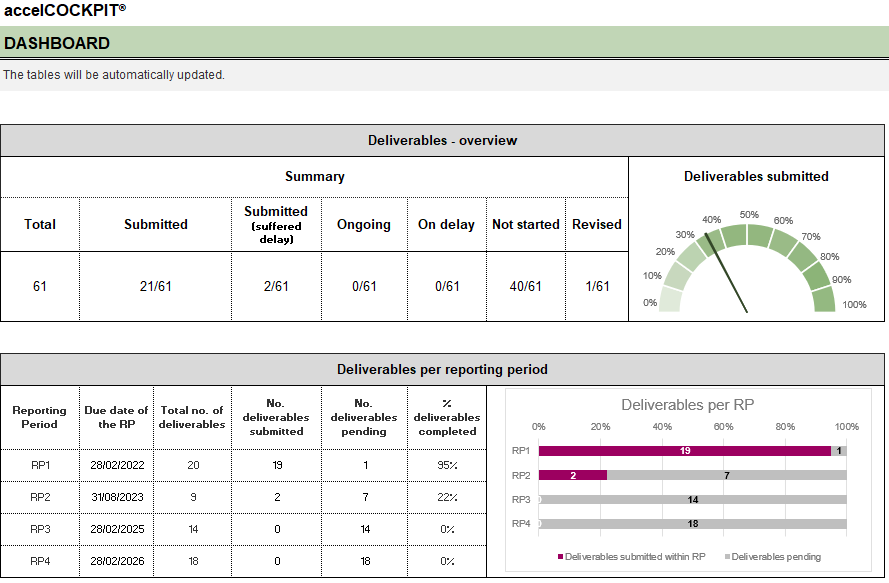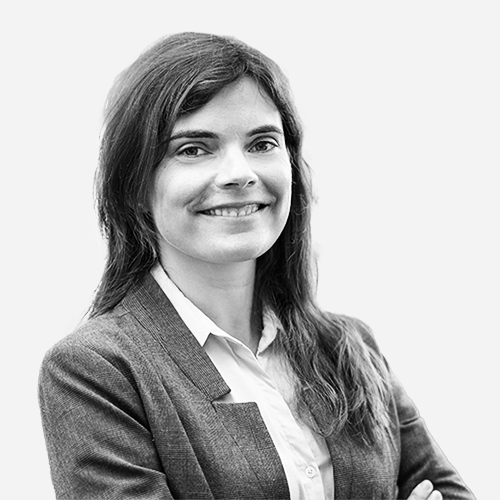Making EU project management efficient with accelCOCKPIT®
13th June 2022 at 3:12 pm
Project coordinators and partners often think that EU project management in Horizon Europe refers to only scientific coordination. However, it also covers the operational management of the grant, bringing together 5 to 15 partners of different backgrounds, with different areas of expertise and from different countries. The project coordinator has a truly challenging job in aligning all of their work towards a joint project goal.
What are the key management tasks in EU projects?
The main EU project management tasks are:
- Administration and organisation of meetings
- Monitoring of work progress and reporting towards the granting authority EC
- Financial management and controlling the use of resources
- Quality and risk management
- Data management, including Open Science
- Intellectual Property (IP) and innovation management
These and other management-related tasks are part of the Description of Action (DoA) – the technical annex to the EC Grant Agreement (EC GA) – and thus a legal obligation. The internal responsibilities and tasks of the project coordinator are stated in the EC Grant Agreement (Chapter 4, Section 1, Article 7): the coordinator must monitor the proper implementation, must act as the intermediary for all communications between the consortium and the granting authority and must distribute the payments received from the granting authority to the other beneficiaries without unjustified delay. These tasks cannot be delegated to other project partners or outsourced.
Although this all sounds straightforward, many other important activities are related to EU project management, and the devil is in the details. Let us share our experience from more than 35 Horizon 2020 projects and the first 12 approved Horizon Europe projects to help you manage your project efficiently.
What are suitable management structures for EU projects?
A suitable project governance structure, depending on the size of the consortium and the complexity of the work plan, can facilitate successful project management, notably by helping to create efficient procedures and effective rules. In principle, there are two options, one for smaller projects and one for larger ones, as proposed in the DESCA model consortium agreement (CA). DESCA is the standard CA template used by most EU-funded R&I projects and has been recently updated and adapted to Horizon Europe to comply with the new EC Grant Agreement. Although the latter always supersedes the CA, which is agreed upon between the partners only, the management structure and procedures, the decision-making rules, the conflict-resolution process and IPRs are defined in the CA exclusively.
Based on our many years of experience as a project management partner in EU Framework Programme initiatives, we recommend the following governance structures for research and innovation actions (RIAs and IAs):

For particularly complex projects, we have had positive experiences with additional committees and working groups, such as a Publication Committee or an Exploitation Group. Additionally, it is quite common to have one or more external Advisory Boards, such as a Scientific Advisory Board, a Patient Advocacy Board and an Innovation Advisory Board. Please note that for Doctoral Networks (DNs) funded under the Horizon Europe Marie Skłodowska-Curie Actions, the governance structure is slightly different and can include several committees.
To organise the different bodies and to ensure that all aspects of the project are addressed in an effective manner, and that someone feels responsible, we recommend appointing individual consortium members for specific roles. Again, depending on the project, it is often useful to have a Quality & Risk Manager, Data Manager and/or Innovation Manager are often helpful to have.
What makes an efficient EU Project Manager?
The role of the EU Project Manager can be divided into an administrative and a technical part. Given that we at accelopment take on the role of Administrative Project Manager (APM), we advise the coordinator to hire a Technical Project Manager (TPM) for the day-to-day management of the research WPs. We are a sparring partner to both, and the tasks and responsibilities can be shared in line with the above-mentioned rules. In the context of European R&D projects, people often use the terms “EU Project Manager” and “APM” interchangeably.

There are some skills that are required by both the APM and TPM, including organisation and communication skills. However, when looking at professional skills, there is a significant difference between the two. While the TPM is expected to be qualified in the project’s research focus, the APM at accelopment has complementary knowledge in EU project finances, reporting and other EU funding-specific skills as well as an understanding of the particular research area. Several years of experience in EU project implementation is clearly an asset to any new project, and the exchange of EU project management knowledge between APMs is essential to keep up to date with the ever-changing rules and to cope with administrative challenges.
Even the most qualified EU Project Managers/APMs still depend on a close collaboration with the coordinating team and the support of all project partners as well as management tools geared to the needs of EU-funded research and innovation projects. As each Horizon Europe project is different, as are their consortia, our multidisciplinary team has developed an EU project management tool that can be easily adapted to new Horizon Europe and other publicly funded R&I projects – the accelCOCKPIT®.
What do EU project managers and pilots have in common?
Our accelCOCKPIT® is already used in more than a dozen H2020 and Horizon Europe initiatives, helping our APMs to navigate the projects. It is indeed a real cockpit, reflecting the commonalities between pilots and project managers, where planning, monitoring and evaluating are constant and highly important tasks. Similar to the pilot of an aircraft, project management is a challenging role. The EU Project Manager performs a highly complex task in which delays, errors, conflicts or other deficiencies can have a detrimental effect on the achievement of project objectives and results. Just like a real cockpit, our accelCOCKPIT® provides an overview of the status of key project management features, including Deliverables, Milestones and Risks, as well as relevant metrics, such as the absolute and relative number of Deliverables achieved in a reporting period and the entire project lifetime (among many others).
Obviously, our EU Project Managers/APMs need to feed the cockpit with some data manually or select items so that the automated accelCOCKPIT® can then generate up-to-date information. For example, whenever a project partner reports a delay of a Deliverable, the tool automatically updates the project schedule (GANTT chart). Another useful feature is the agile risk matrix, which helps the coordinator identify risks early and, if necessary, initiate mitigation measures in a timely manner. Thanks to the accelCOCKPIT®, we are able to navigate and steer the projects proactively and provide real-time information to any partner at any time. This has special relevance when it is time to prepare the very demanding periodic reports.
Finally, the accelCOCKPIT® allows us to measure the performance of the project management process through Key Performance Indicators (KPIs), including the timeliness of the minutes’ availability and achievement of deliverables and milestones. One of the KPIs assesses the number and duration of often time-consuming contract amendments, which provides valuable information for the planning of future Horizon Europe projects and resources.
How can we help you navigate your Horizon Europe project?
What started out during the 7th Framework Programme has been carried on through to Horizon 2020 and has become a long history of supporting EU-funded projects. Our enthusiasm has not halted with the transition to the 9th Framework Programme Horizon Europe. Since our foundation, we have been collaborating with more than 1,000 organisations in Europe and beyond.
Thanks to our participation in almost 100 EU-funded projects, including the first 12 Horizon Europe RIAs, IAs and DNs, we have translated our wealth of expert knowledge and experience into the accelCOCKPIT®. Our mission is to make EU project management easy and thereby contribute to Europe’s innovation capacity.
If you are interested in learning more about the accelCOCKPIT® and our project management support, please contact one of our EU Project Managers.

Andreia Cruz
Research & Innovation Project Manager

Dr. Johannes Ripperger
Research & Innovation Manager

